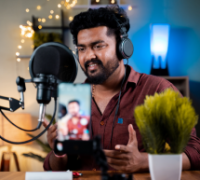In the course of just a decade, influencers have transformed the face of commerce. Beforehand, it seemed no brand could move the dial without a pricey TV or OOH marketing campaign; now, in many cases, marketeers prefer to pay ‘regular' people (albeit those with more followers than the average person) to build awareness of their brand - as long as they have a loyal following. No one could have predicted the scale of the shift. And as influencers have gained more power, confidence, and experience - backed, of course, by brand deals and more - inevitably the content filling our feeds has become more and more polished.
This shift is something that happens to all industries as they mature, so it's not in itself surprising.
But the difference between influencers and traditional marketing, is that influencers are selling themselves, in addition to the products.
Like any industry, the world of influencing continues to evolve and develop to engage with and meet consumer demands. The latest evolution we have noticed is a hunger for realism and ‘unpolished' content from followers that will soon start to have genuine consequences for the ways brands and influencers work together. Brands are important to influencers, of course, but there is one relationship more important to them: their relationship with their followers. Important parts of any relationship is vulnerability and transparency.
As an experienced social media marketeer myself, I know that this authenticity edge is what makes influencers stand out in the crowd, attract people, and keep them engaged - so it really cannot be taken for granted.
In my eyes, that's what makes the most recent trend in this area - so-called "de-influencing" - so compelling. Traditional influencing generally prioritises "positive" communication. That means if an influencer does not recommend a product or service, they'll generally not mention it, or suggest a better alternative instead. While this is a perfectly valid way to communicate, de-influencing takes things a step further, strategically and intelligently helping influencers cut through the noise by actively taking a new approach and deterring people from making unnecessary purchases. For example, ‘de-influencers' shedding light on problematic microtrends which encourage over consumption or highlighting ineffective products which don't live up to the claims and promises made, as well as offering other "minimalist" life hacks. This comes at a time when many people are aware of every penny spent as the world finds itself in the grips of a cost-of-living crisis.
So - how can businesses and brands use this new approach to their advantage?
Brands which offer ‘bang for buck', an environmental emphasis and / or long product life could benefit from this format. More and more people have become aware of the impact their actions have on the environment and sustainable consumer behaviour is on the rise, thanks to influencer marketing.
Overall, it's going to be a case of many brands having to adapt their marketing strategies. Brands will have to adapt to the moving times, of course, and in the wake of de-influencing I believe we will see less reliance on high-profile, celebrity influencers and more engagement with well-trusted micro-influencers, that people know are doing their due diligence around every product and brand. De-influencing will give influencers the confidence to present a more balanced viewpoint about their experiences of different brands or products, without worrying about upsetting their followers. This will only serve to strengthen people's trust in them - particularly during an economic crisis, when people are watching every penny.
Brands will also seek long-term partnerships with social publishers and creators to incorporate authenticity and transparency into their brand strategy. One-off influencer campaigns are becoming outdated and less authentic, and the leveraging of creators and publishers will be increasingly beneficial.
The knock-on effect for influencer playgrounds like TikTok and YouTube is that people will increasingly come to view them as credible shoppable platforms. Already social media is becoming the favoured way to search among millennials and Gen Z, and there's still so much more room for investment and development. It's human nature to seek out second opinions when we make decisions, and this is exactly what makes influencers so powerful. The de-influencer trend will simply take this a step further by offering audiences more well-rounded, critical viewpoints.
As people hang tight to their purse strings, influencers have a powerful role to play here in helping people become more intentional shoppers. It reminds me of the early days of the dot.com era, when you wouldn't be caught dead booking a hotel without first checking TripAdvisor (in fact, that's not really changed). The best brands are always actively looking to create more authentic relationships with their customers - de-influencing will make that more than possible. Rather than spelling the end of the industry, I see it as a chance for reinvention and renewal, which could not come at a better time.






